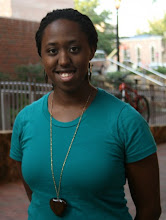Most U.S. students have a hard time adjusting in the fall. In the States, the fall semester begins in late August and ends in mid-December to enjoy the winter holidays. In Spain and other European countries, the semester begins in late September. Everyone takes a break for the winter holidays and resumes classes in January to finish the semester in late January of early February. It makes absolutely know sense to me.
The students in the UNC in Sevilla program have to leave in December, so we were forced to travel up and down the halls of La Universidad de Sevilla, sit in an hour-long class and then ask the professor if he/she will allow U.S. students to take the exam early. I got shot down three times by professors who weren't willing to budge. That meant I had to keep searching for classes for which I would receive transfer credit at UNC. I was about to spaz, but Ángeles, my program director, said, "Tranquila, Dioni. Tranquila."
Soon I started to having fun amidst the chaos. It was as if I were playing musical chairs with literature and philosophy classes. And, yes, I have finalized my schedule. I'm super-excited about one course, in which I'll study the Quran or el Corán. So I hope to graduate on time on
May 10, 2009. But if not, my excuse will be, "I got screwed by the system."
Here are some more key differences between the Spanish and U.S. university systems:
- Tuition in Spanish public universities is very modest compared to those in the U.S. Tuition here can range from 500 to 800 Euros ($750 to $1200). But Spanish students don't have as many resources -- large gyms, campus health services or the many computer stations seen in the States.
- Nearly all of the students live at home and commute. Dorms are few and far between on Spanish campuses.
- The 'campus' of the Universidad de Sevilla is not centralized in the same sense as American universities. For example, UNC campus buildings are situated in one, very large area. Sevilla's campus is spread throughout town, so you have to catch a bus or walk for 30 minutes from the School of Geography and History to the School of Business. Sevilla has about five main, but separate locations.
- Due to the decentralized campus and other factors, Sevillano students are only allowed to take classes in one school. So Rafael could not receive a degree in Law and Medicine like I could double major in Journalism and Spanish. On the other hand, having only one concentration allows Sevillanos to have a profound wealth of knowledge in that one area.
- Each of the different disciplines or schools have its own system, including its own teachers, classrooms, exam schedules and beginning and ending dates of classes. It's not too different from schools in the States, but I showed up Monday to a history class to learn that the history department wouldn't start classes until Wednesday, but the Spanish Philology department began classes Monday. Each department has it's own copistería. A copistería is a Kinko's, of sorts, where students can buy photocopies, school supplies, textbooks and the 'syllabus' for each class. On UNC's campus, students visit a one-stop shop for class materials in several departments.
- The 'syllabus' in the states is an ironclad schedule of day-to-day events that lists your required text and due dates for homework, papers and exams. In Sevilla, the professor gives students a general list of themes and an optional bibliography. So students might not have homework and might not have read one book an entire semester.
- In the States, participation is usually a part of your grade. In Sevilla, the less participation the better.
- In Sevilla, learning is individual. Professors don't host study groups or review sessions and they might not attend their hours of consultation. At Carolina, our professors beg us to come to office hours and receive help. What a difference!
- The grading system here is based on a scale of one to 10. Below five is failing and a 10 is out-of-the-world amazing, because some teachers pride themselves on grading toughly.
- Library books are mainly for consultation in Sevilla, so you can check them out for months at a time. (I hear that's what people do at UNC.)


No comments:
Post a Comment